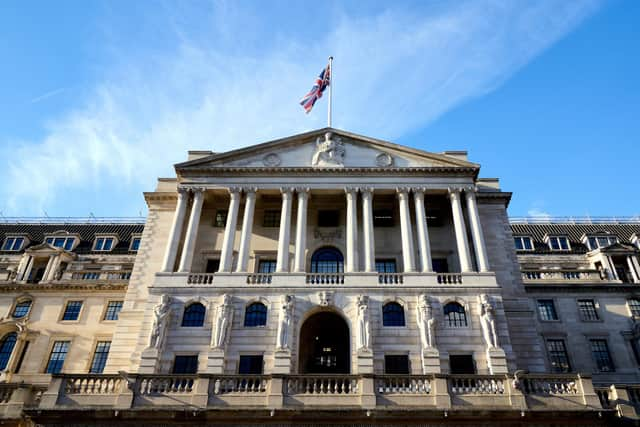Analysis: Borrowers praying for light at end of the interest rate tunnel
In a widely anticipated move, the Bank of England opted to increase the UK base interest rate from 3.5 per cent to 4 per cent, with just two dissenting voices out of nine members on its monetary policy committee (MPC). It is likely to trigger almost immediate further pain for millions of borrowers with variable rate mortgages, other borrowings and credit cards.
The move comes after the US central bank, the Federal Reserve, shifted to a more cautious quarter-point hike this week as inflation cools but the labour market in the world’s largest economy remains tight. The European Central Bank, meanwhile, increased rates by a half-point and raised the prospect of an equal rise next month. Most economists expect Britain’s central bank to nudge rates up further but the latest rise could be the last half-point one. The MPC has softened its language, removing a promise to act “forcefully” to return inflation to its target level of 2 per cent, compared with the current annual rate of just over 10 per cent.
Advertisement
Hide AdAdvertisement
Hide AdBen Laidler, global market strategist at social investing network eToro, notes that UK inflation remains among the world’s highest, but has been falling for two months, while the bulk of the economic slowdown has still to be felt. “This has given the Bank flexibility to indicate that the light at the end of the tunnel is nearing, resulting in a slower hiking pace, with a peak likely in the next few months,” he said. “The Bank also eased back on its forecast of a ‘prolonged recession’ as energy prices have fallen, and the economy stabilised after the Truss ‘shock’.”
Kevin Brown, savings specialist at Scottish Friendly, the Glasgow-based mutual, said: “The big question is where we go from here. Inflation in the UK is looking particularly sticky compared to international peers. Interest rates have risen like a rocket in a matter of months and may fall like a feather as inflation lingers on in 2023. As ever, banks and building societies are likely to raise borrowing costs quicker than the interest rates offered on savings, so the negatives of [this latest] decision will outweigh the positives.”
Thomas Pugh, economist at audit, tax and consulting firm RSM UK, believes there will be another rate rise this year, but not of the same magnitude, adding: “An exceptionally tight labour market and sticky core inflation mean that at least one more interest rate hike in March seems justified. The big risk is that if the recession turns out to be milder than expected, the MPC significantly upgrades its GDP forecasts and the labour market remains tight, then more rate hikes will be on the cards after March.”
While those with mortgages and other borrowings are likely to feel the effects almost instantly, savers may not reap the full benefits for some time, if at all. Banks and building societies have been criticised for taking too long to pass on higher savings rates, and nowhere close to the half-point hikes charged to borrowers.
There is some good news for savers though. Research released by Money.co.uk reveals that fixed-rate bond interest rates have increased by more than 400 per cent in the past year.


Personal finance expert Lucinda O’Brien said: “Amidst the cost-of-living crisis, inflation at a 40-year high and a September mini Budget that caused chaos, providers started to battle with each other by trying to produce the best rates to win customers. This meant we could finally start to see some return if we put our money into a savings account; especially with fixed-rate bonds. In January 2022 the average interest rate for a one-year fixed rate bond was 0.71 per cent, but by the beginning of December 2022 it had risen to 3.61 per cent. This month, the average interest rate for a one-year fixed rate bond stands at 3.59 per cent - a slight decrease from December - but still a 406 per cent increase from last year.”
The pound failed to cash in on the hike in rates as currency traders latched onto some downbeat comments from the Bank of England. Samuel Fuller, director of Financial Markets Online, said: “Any upside sterling might have enjoyed from a UK interest rate rise double the size of [the] hike from the Fed was quickly lost as the gravity of the Bank of England’s analysis sank in. Most worrying of all, the Bank reports that business investment - the key to boosting the economy long-term - is still ‘very subdued’ and below even its pre-referendum levels. The pound is now on course to end the week down sharply as the bleak forecasts for the UK multiply.”
Business leaders appeared resigned to the prospect of higher borrowing costs for firms already struggling with soaring costs but warned that the Bank’s hard-line approach came with risks.
Advertisement
Hide AdAdvertisement
Hide AdDavid Bharier, head of research at the British Chambers of Commerce, said: “Those impacted most by [this] decision will be mortgage holders and businesses reliant on debt to keep afloat after three years of economic shocks. With the Bank expecting inflation to slow to around 4 per cent by the end of the year, further rate rises could now simply add to the risk of a deeper recession, outweighing the benefits.”


The Federation of Small Businesses said firms would be hoping that the inflation peak has passed. National chairman Martin McTague said: “Small businesses are hoping against hope that [the] rise in the base rate will signal a turning point in the Bank of England’s battle to bring inflation under control.”
Comments
Want to join the conversation? Please or to comment on this article.